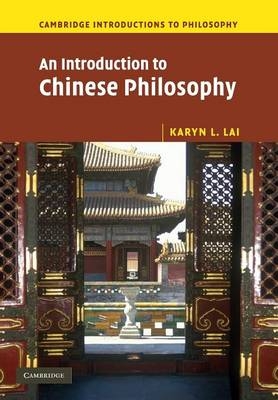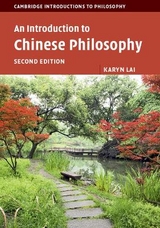
An Introduction to Chinese Philosophy
Seiten
2008
Cambridge University Press (Verlag)
978-0-521-60892-3 (ISBN)
Cambridge University Press (Verlag)
978-0-521-60892-3 (ISBN)
- Titel erscheint in neuer Auflage
- Artikel merken
Zu diesem Artikel existiert eine Nachauflage
Introduces students to all of the concepts, themes and argumentative methods of early Chinese philosophy, covering the three most influential philosophical traditions, Confucianism, Daoism and Buddhism. Karyn Lai explains debates among different thinkers, cross-influences between traditions, and the interpretation of the main ideas by scholars up to the present day.
This comprehensive introductory textbook to early Chinese philosophy covers a range of philosophical traditions which arose during the Spring and Autumn (722–476 BCE) and Warring States (475–221 BCE) periods in China, including Confucianism, Mohism, Daoism, and Legalism. It considers concepts, themes and argumentative methods of early Chinese philosophy and follows the development of some ideas in subsequent periods, including the introduction of Buddhism into China. The book examines key issues and debates in early Chinese philosophy, cross-influences between its traditions and interpretations by scholars up to the present day. The discussion draws upon both primary texts and secondary sources, and there are suggestions for further reading. This will be an invaluable guide for all who are interested in the foundations of Chinese philosophy and its richness and continuing relevance.
This comprehensive introductory textbook to early Chinese philosophy covers a range of philosophical traditions which arose during the Spring and Autumn (722–476 BCE) and Warring States (475–221 BCE) periods in China, including Confucianism, Mohism, Daoism, and Legalism. It considers concepts, themes and argumentative methods of early Chinese philosophy and follows the development of some ideas in subsequent periods, including the introduction of Buddhism into China. The book examines key issues and debates in early Chinese philosophy, cross-influences between its traditions and interpretations by scholars up to the present day. The discussion draws upon both primary texts and secondary sources, and there are suggestions for further reading. This will be an invaluable guide for all who are interested in the foundations of Chinese philosophy and its richness and continuing relevance.
Karyn L. Lai is Senior Lecturer in the School of Philosophy, University of New South Wales. She is author of Learning from Chinese Philosophies: Ethics of Interdependent and Contextualised Self (2006).
Preface; List of dates; 1. Chinese philosophy; 2. Confucius and the Confucian concepts Ren and Li; 3. The cultivation of humanity in Confucian philosophy: Mencius and Xunzi; 4. Early Mohist philosophy; 5. Early Daoist philosophy: the Dao Di Jing as a metaphysical treatise; 6. Early Daoist philosophy: Dao, language and society; 7. The School of Names and later Mohists; 8. Zhuangzi's philosophy; 9. Legalist philosophy; 10. The Yijing and its place in Chinese philosophy; 11. Chinese Buddhism; Postscript; Glossary; Bibliography; Index.
| Erscheint lt. Verlag | 31.7.2008 |
|---|---|
| Reihe/Serie | Cambridge Introductions to Philosophy |
| Verlagsort | Cambridge |
| Sprache | englisch |
| Maße | 174 x 247 mm |
| Gewicht | 670 g |
| Themenwelt | Geisteswissenschaften ► Philosophie ► Östliche Philosophie |
| Geisteswissenschaften ► Religion / Theologie | |
| ISBN-10 | 0-521-60892-9 / 0521608929 |
| ISBN-13 | 978-0-521-60892-3 / 9780521608923 |
| Zustand | Neuware |
| Haben Sie eine Frage zum Produkt? |
Mehr entdecken
aus dem Bereich
aus dem Bereich



